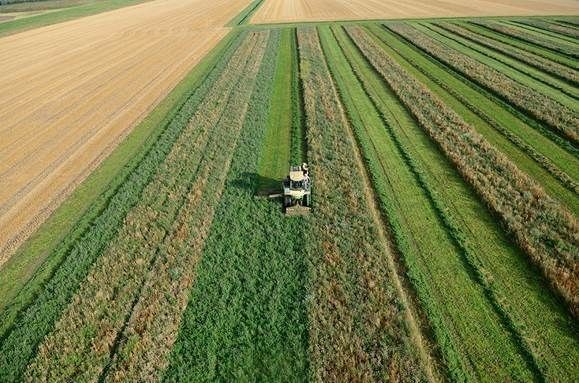Liekuut | Not the farmer but the system is the problem
In ‘Liekuut’, which is the Groningen dialect for straight ahead or straightforward, we regularly share the perspective of one of our academics on a topical issue. This is how we show that UG researchers contribute to the societal debate.
There is a lot of discussion about nitrogen, soil quality, groundwater, and biodiversity. And about farmers. However, according to Raymond Klaassen, ecologist at the Faculty of Science and Engineering of the University of Groningen, these farmers are mostly victims of the system that we shaped together. In his view, we should mainly pay attention to the agroindustry and then, through fairly small modifications, we can greatly improve the life of the farmer and our landscape.
Inedible landscape
‘When I drive around North Groningen, where I do a lot of field research, I am surrounded by fields of sugar beets, starchy potatoes, and grains. Which of these could I eat? I could eat sugar, but it’s not very healthy, the starch from the potatoes is processed into various things but is not meant for consumption, and the grains are mainly grown as fodder. In other words: it’s an inedible landscape, which in that sense is of very little use to us. The reason why farmers work like this? Because it brings in the most money. But this work method is so intensive that it results in all sorts of problems with the soil, the groundwater, nitrogen, etc. And we as a society bear the costs for solving those problems. That’s not entirely fair.’
The farmer carries out
’At the same time, we shouldn’t be angry with the farmer for they are in a rather lousy income position. They work hard but earn little and are vulnerable to crop failures. Of course, a lot of money is involved in these farms, but they are very dependent and the bottom line doesn’t show a lot of profit. This is how we have organized the system together: a system that is focused on production, maximum yield per acre. As far as I’m concerned, it is the agroindustry that bears a huge responsibility in this, not the farmer. The farmer is first and foremost the one who carries out the work. It’s mainly the big enterprises that purchase and process the products, that supply pesticides and seeds, that have controlled a lot in the landscape. The revenue model of that whole industry around the farmer comes down to one thing: production, more, more, more. And that’s why, when the farmer isn’t doing very well, they see intensifying as the solution. But it’s not the solution, it’s the root of the problem; farmers should actually reduce their efforts.’

Sustainable agriculture
‘Instead of a system that focuses on maximizing output, we should assume a system that is much more able to support itself–without all those external inputs such as pesticides and artificial fertilizer–more like an ecosystem. In arable farming, we should put the quality of the soil at the centre and cherish the soil life as well by, for example, no longer ploughing the fields and by using organic fertilizer to fertilize, rather than artificial fertilizer or slurry. This would result in a more resilient system with healthier crops. Farmers who apply this type of environmentally friendly principles can manage with half the amount of pesticides on the average farm. In addition, and crucially, they are able to grow more than just potatoes, beets, and grains. Preferably, they would grow legumes, because they are very beneficial to the soil. This variation is very important for biodiversity, including the farmland birds that are my research subjects. And because you’re not growing crops that are susceptible to disease in quick succession, you will see less diseases and pests–a true win-win situation. We can solve so many problems by working in an environmentally friendly manner. Why aren’t we doing that? Because it makes the farmer go under. Working in an environmentally friendly way brings in a lot less money.’
Responsibility
‘The farmer is simply stuck in the system as it has been made now, and even if they would like to work in an environmentally friendly way, they just don’t have the money for it within the current ‘game rules’. But when we add everything up, the difference in yield can be compensated with a few cents extra per litre of milk or per kilogram of grains. We, as a society, could pay for it, but we are also already paying for all the problems caused by this intensive work method. You could also pass the bill to the agroindustry that causes all these problems. Let’s for once say: you may continue with making your farmers grow crops like this, but you’re now also going to pay to get the water cleaned. Hopefully then they will also realize that working sustainably is a better revenue model. However, in the end, it’s also a very political choice. It’s about time that they step away from the short-sighted policy and create a long-term vision about what is truly good for our country.’
| Last modified: | 07 February 2024 5.22 p.m. |
More news
-
13 May 2024
Trapping molecules
In his laboratory, physicist Steven Hoekstra is building an experimental set-up made of two parts: one that produces barium fluoride molecules, and a second part that traps the molecules and brings them to an almost complete standstill so they can...
-
29 April 2024
Tactile sensors
Every two weeks, UG Makers puts the spotlight on a researcher who has created something tangible, ranging from homemade measuring equipment for academic research to small or larger products that can change our daily lives. That is how UG...
-
16 April 2024
UG signs Barcelona Declaration on Open Research Information
In a significant stride toward advancing responsible research assessment and open science, the University of Groningen has officially signed the Barcelona Declaration on Open Research Information.
